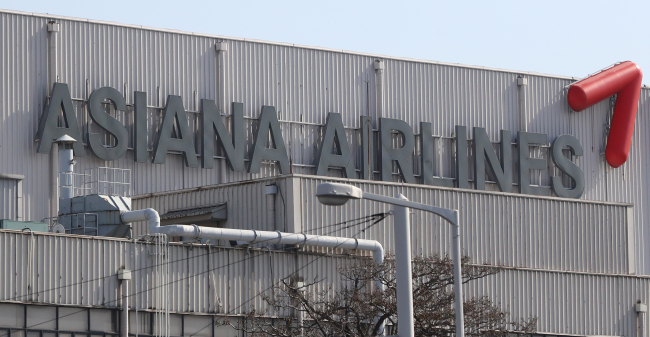Asiana Airlines, South Korea's second-biggest airline by sales, will move to secure liquidity and bank loans through the sale of additional assets, the company's chief executive said Monday.
In a letter sent to employees, Asiana Airlines CEO Han Chang-soo said the company will "suspend non-profitable routes and reduce the number of planes to swiftly respond to changing market demands."
 |
(Yonhap) |
Asiana's task force team went into operations to transform the financially-troubled full-service carrier into a productive and effective company, he said.
The CEO's message comes after the state-run Korea Development Bank, the main creditor of Asiana, asked the airline to come up with a stricter self-help plan to "resolve market concerns and regain the confidence of investors" last week.
On Wednesday, KDB Chairman Lee Dong-gull made the remark when he met Kumho Asiana Group Chairman Park Sam-koo to discuss the future of the airline-to-chemical conglomerate. On the following day, Park announced he will resign from all key posts at the group to take responsibility for the recent controversy over an unfavorable audit report on the airline.
Park asked the KDB to do all it could to help Kumho Asiana stay afloat.
In response to Park's request, Lee said that top priority should be the restoration of market confidence in the group and its large shareholders, among others.
Park resigned after auditor Samil PricewaterhouseCoopers issued a negative assessment of the company's financial status on March 22. Shares in Asiana plunged 15 percent on March 26.
The auditor questioned the lack of transparency on provisions for leasing aircraft and the value of assets, as well as financial information for its budget carrier units: Air Seoul Inc. and Air Busan Co.
It issued an "unqualified" assessment of Asiana's 2018 annual report after reviewing a revised annual report submitted by Asiana. The revised report showed Asiana posting a net loss of 96.3 billion won ($85 million) in 2018.
The view comes after the accounting firm delivered a negative "qualified" assessment to Asiana's original annual report. The term "qualified" means the auditor's auditing scope is limited, as the company's financial figures are not in accordance with generally accepted accounting standards.
Asiana currently owes 3.2 trillion won to financial institutions and has to repay 1 trillion won of the total this year.
Asiana signed a memorandum of understanding with the state lender in April last year to improve its financial status. It has focused on securing liquidity by selling the group's headquarters building and noncore assets, as well as issuing convertible bonds, in the past year.
As a result, the group's debt-to-equity ratio fell to 364.3 percent at the end of 2018, down 30 percentage points from a year earlier. Its overall borrowings also decreased by 1.2 trillion won to 3.952 trillion won.
"We are in talks with the KDB to extend the MOU for another year to put the company back on track," a company spokesman said. (Yonhap)







